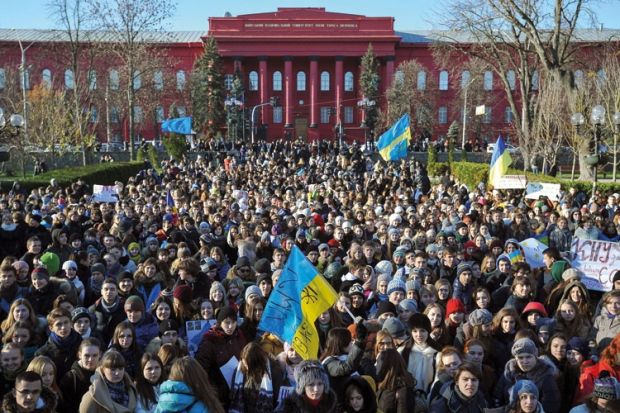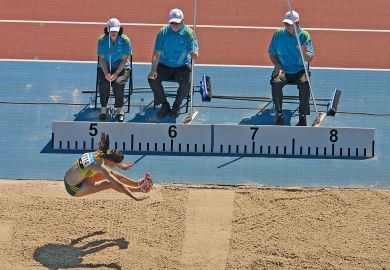Source: Alamy
Peaceful protests: Ukrainian students have achieved changes to governance
The array of degrees achieved by deposed Ukrainian president Viktor Yanukovych illustrates many of the country’s higher education problems.
According to his CV, Yanukovych holds a master’s degree in international law and a doctorate of science in economics – all achieved while he was serving as governor of the Donetsk Oblast region between 1997 and 2002.
Although the degrees are valid, many have questioned their academic worth as few people remember the larger-than-life politician attending any classes or exams during this period.
Similar doubts are raised by the “professor” role he lists on his CV as it is registered to the International Academy of Sciences, Education, Industry and Arts, an organisation that states its contact address as a PO box in Mount View, California.
Such suspect claims to academic status also apply to the courses offered to prospective students at many universities, said Volodymyr Lugoviy, first vice-president of the Institute of Higher Education of the National Academy of Pedagogical Sciences, which is advising the Ukrainian government on university matters. “The quality of [some Ukrainian university courses] does not match what is advertised,” Dr Lugoviy told Times Higher Education on a recent visit to London.
There are currently 1.7 million students in Ukrainian universities – a high rate of enrolment for a country of 45 million people, said Dr Lugoviy.
“Ukraine is now a leader in terms of the quantity of students, but it’s behind in terms of quality,” he said, citing the numerous institutions (345 have full university status) scattered across the vast East European state, many of which have sprung up in the past 20 years to cater for the growing demand for education after the fall of the Soviet Union.
But the system that left institutions “free to develop as they wish” and allowed student numbers to triple in just over two decades now requires tougher regulation to stamp out abuses that have become all too common, Dr Lugoviy said.
Using the UK’s Quality Assurance Agency as its model, Ukraine intends to set up a similar independent peer review system of academic checks, particularly focused on false claims made in university prospectuses.
A draft bill drawn up by Dr Lugoviy and his team is due to be discussed in the next parliamentary session and could lead to the country’s first higher education legislation since 2002.
The reforms also include provisions to democratise Ukrainian universities, which are still primarily governed by Soviet-style diktats from central government, Dr Lugoviy added.
It could give students an important say in university governance; they played a leading role in the so-called “Euromaidan Revolution” in Ukraine that toppled Yanukovych.
During the uprising, student activists blocked off the Ministry of Science and Education for several weeks to demand the introduction of greater institutional transparency and accountability, as well as a new administration team to take charge of higher education.
The peaceful protests have led to the appointment of Serhiy Kvit – former rector of the National University of Kyiv-Mohyla, a former Fulbright scholar at Ohio University and a champion of university autonomy – as the minister of education and science in the new Ukrainian government of interim prime minister Arseniy Yatsenyuk.
“Young Ukrainians who have been demonstrating want European democratic values and, in our plans, students will become one of the main stakeholders in universities,” Dr Lugoviy said.
Register to continue
Why register?
- Registration is free and only takes a moment
- Once registered, you can read 3 articles a month
- Sign up for our newsletter
Subscribe
Or subscribe for unlimited access to:
- Unlimited access to news, views, insights & reviews
- Digital editions
- Digital access to THE’s university and college rankings analysis
Already registered or a current subscriber? Login





